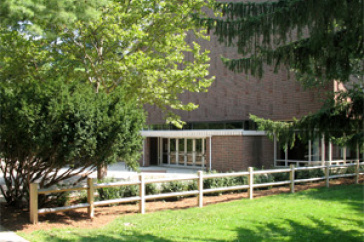UNH Professor's New Book Explores the Meaning of Home

Paul Creative Arts Center theatre
DURHAM, N.H. - A recently widowed husband reaches over to touch his wife and discovers the bleak reality that she is not there anymore. A homebound homeowner increasingly relies on the physical and emotional rewards of a house overrun with cats.
How do acts of caring for the sick or grieving for the dead change the way we move through our living rooms and bedrooms? Why do elderly homeowners struggle to remain in messy, junk-filled houses? Why are we so attached to our pets, even when they damage and soil our living spaces?
In "Home Bodies: Tactile Experience in Domestic Space," James Krasner, professor of English at the University of New Hampshire, offers an interdisciplinary, humanistic investigation of the sense of touch in our experience of domestic space and identity.
Accessing the work of gerontologists, neurologists, veterinarians, psychologists, social geographers, and tactual perception theorists to lay the groundwork for his experiential claims, he also ranges broadly through literary and cultural criticism dealing with the body, habit, and material culture. By demonstrating crucial links between domestic experience and tactile perception, "Home Bodies"investigates questions of identity, space, and the body.
Krasner believes that "literary study should help address important human problems, and, if possible, point toward practical solutions. It's not enough to read about human suffering in books, even if we are reading them very thoughtfully. We need to use our critical skills, in tandem with scholars in medical and social science fields, to help alleviate human suffering."
Krasner analyzes representations of tactile experience from a range of canonical literary works and authors, including the Bible, Sophocles, Marilynne Robinson, Charles Dickens, John Steinbeck, and Sylvia Plath, as well as a series of popular contemporary texts. The work contributes to discussions of embodiment, space, and domesticity by literary and cultural critics, scholars in the medical humanities, and interdisciplinary thinkers from multiple fields.
The book has received critical acclaim.
"Home Bodies exemplifies some of the best work in health humanities. Employing his fine eye as an English studies scholar, James Krasner makes observations in matters of the body, health, medicine, and culture. His research is meticulous; his project marries the study of the body and the study of domestic space and offers an account of the embodied human experience within the materiality of a range of versions of home. Home Bodies is original and compelling," said Judith Segal, professor of English at the University of British Columbia.
In addition to "Home Bodies," James Krasner has published studies of Charles Darwin, Sherlock Holmes, women primatologists, and a variety of British Victorian writers. His teaching interests include the Bible, love poetry, and an American Anglophilia. He is currently working on a study of architecture and literature.
The University of New Hampshire, founded in 1866, is a world-class public research university with the feel of a New England liberal arts college. A land, sea, and space-grant university, UNH is the state's flagship public institution, enrolling more than 12,200 undergraduate and 2,200 graduate students.
-30-
-
Media Contact
UNH Department of English | UNH Department of English | jkrasner@cisunix.unh.edu | 603-862-1877
Latest News
-
July 2, 2024
-
June 18, 2024
-
June 18, 2024
-
May 17, 2024
-
May 14, 2024

















































